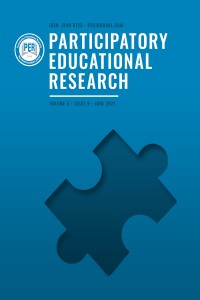Research Article
Year 2022,
Volume: 9 Issue: 2, 136 - 149, 01.03.2022
Abstract
References
- Demiralp, D. & Kazu, H. (2017) Öğretmen adaylarinin etkili yaşam boyu öğrenme düzeylerinin çeşitli değişkenler açisindan karşilaştirilmasi [Comparison of effective lifelong learning levels of pre-service teachers in terms of various variables] Inonu University Journal of the Faculty of Education (INUJFE), 18( 3), 71-85
Investigation of The Relationship Between Lifelong Learning and Epistemological Beliefs of Associate Degree Students’
Abstract
The aim of this study is to investigate the relationship between lifelong learning and epistemological beliefs of associate degree students. In the study, correlational method, which is one of the qualitative research methods, was employed. The population of the study consisted of students studying at a vocational high school of a state university in Turkey and the sample of the study consisted of 360 students selected from the population through convenience sampling. In the study, the “Lifelong Learning Scale” adapted by Engin, Kör and Erbay (2017) and the “Epistemological Beliefs Scale” adapted by Aydın, Selçuk, Çakmak and İlğan (2017) were used to collect data. Descriptive statistics, pearson correlation analysis, regression analysis, hierarchical regression and two-way analysis of variance were used for data analysis. As a result of the study, a positive, significant and nearly medium level relationship was found between lifelong learning and epistemological beliefs of associate degree students. In addition, it was found that epistemological beliefs predict students’ lifelong learning by 8.7%. While there was a positive and moderate level relationship between the effort dimension, which is the sub dimension of epistemological beliefs, and lifelong learning, a positive and weak level relationship was obtained between lifelong learning and a single truth sub dimensions of the epistemological beliefs scale. On the other hand, there was almost no relationship between the ability sub dimension and students’ lifelong learning level. In addition, when the epistemological beliefs of the students and independent variables (gender, class, type of education, age, department and department type) were considered as common variables, no statistically significant difference was found in terms of lifelong learning level of the students.
References
- Demiralp, D. & Kazu, H. (2017) Öğretmen adaylarinin etkili yaşam boyu öğrenme düzeylerinin çeşitli değişkenler açisindan karşilaştirilmasi [Comparison of effective lifelong learning levels of pre-service teachers in terms of various variables] Inonu University Journal of the Faculty of Education (INUJFE), 18( 3), 71-85
There are 1 citations in total.
Details
| Primary Language | English |
|---|---|
| Subjects | Other Fields of Education |
| Journal Section | Research Articles |
| Authors | |
| Publication Date | March 1, 2022 |
| Acceptance Date | August 23, 2021 |
| Published in Issue | Year 2022 Volume: 9 Issue: 2 |


